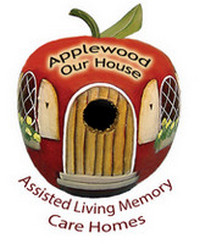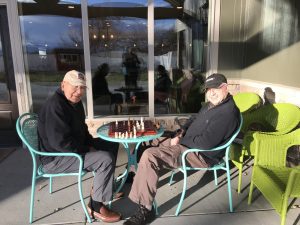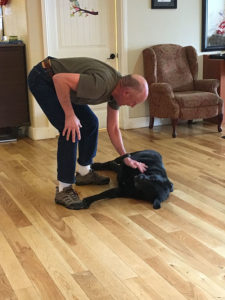
Alzheimer’s Disease

In 1906, Dr. Alois Alzheimer first noticed and described the change that happens in the brain. He found amyloid plaques (basically abnormal clumps) and bundles of fibers that were tangled in clusters (now referred to as Neurofibrillary Tangles). This is now the mapped pattern in the brain that all Alzheimer patients go through.
It is not known how Alzheimer’s disease begins; but it is known that damage in the brain can begin 10 to 20 years before any signs of Alzheimer’s disease become obvious. Alzheimer’s disease begins in the Cortex, the part of the brain that directly affects our memory, and will slowly progress to other areas of the brain. As nerve cells throughout the brain begin to die and the affected areas shrink. During the final stages of Alzheimer’s disease, the tissue in the brain will have shrunk significantly.
Let me try to put it in simple terms. Imagine a large town that has all its lights on, people go about their daily activities with ease. Now consider that there is a problem with the town’s electrical system. Slowly, each home and business loses lights and power; making cooking and driving through town more challenging. Apply this analogy to the brain and image each brain cell is a light bulb within the town. Alzheimer’s disease “turns off” each cell (brain neutrons) just like light bulbs. These “turn off” in the brain, yet unlike light bulbs, they are not replaceable or repairable.
Alzheimer’s disease is incurable and irreversible, but the good news is that it can be slowed down. With medications and natural diet options.

SYMPTOMS
MCI (Amnestic Mild Cognitive Impairment) – could be the very first sign of Alzheimer’s, as patients have more difficulty remembering things than most of their peers do. Other signs of Mild Alzheimer;s Disease include:
- Asking the same questions over and over again
- Unable to properly pay bills or handle money
- Forget what they are in the middle of (preparing a meal, leaving the stove top or oven on)
- Tendency to get lost increases
- Possible personality changes
At the moderate stage of Alzheimer’s disease; language and sensory reactions are affected. Other symptoms include:
- Compulsive behavior may surface
- Confusion and disorientation about time increases
- Tasks that involve more than one step (for example: getting dressed) gets more difficult
- Unable to learn something new
- Ability in recognizing friends and family decreases
- Paranoia and delusions may be apparent
- The patient loses interest in activities and hobbies that they once enjoyed and found great pleasure in doing
Once severe Alzheimer’s disease hits, the patient is totally dependent on a compassionate and loving caregiver. At this stage; signs include:
- Weight loss/ difficulty swallowing
- Unable to clearly communicate
- Inability to control bladder or bowel movements
- Increase in sleep
- Seizures
The major misconception of Alzheimer’s disease is that it is not a normal part of the aging process. Also, don’t believe that you are safe from Alzheimer’s disease because you are under the age of 65 because, as of today, there are more than 200 thousand reported cases of Alzheimer’s that affect people under the age of 65, also referred to as early-onset Alzheimer’s.
If you are the adult child or spouse of a person afflicted with Alzheimer’s disease, there are a few things you will need to have your loved one do so that you may inquire about their medical condition. You will want to speak in depth to your loved one’s doctor and this will require your loved one to sign a HIPAA form. The HIPAA (Health Insurance Portability and Accountability Act) provides protection and privacy to any medical records; so it is important that this is taken into consideration early in the Alzheimer’s disease diagnosis. Without a HIPAA form it will be very difficult to get answers about your loved one.
The “Alzheimer’s Association” is a helpful, resourceful and respected Association that provides up to date information, education and encouragement for caregivers of Alzheimer sufferers as well as support for the entire family. Their 24 hour phone lines (1-800-272-3900) are maintained by real, compassionate and educated people that are ready to answer all your questions. Their website is full of printable educational and supportive information for everyone involved. The last thing we want is for you to feel alone. Educate yourself, join a support group, share frustrations and more importantly, learn helpful tips to give your loved one the proper care, compassion and dignity they deserve.






1 Comment